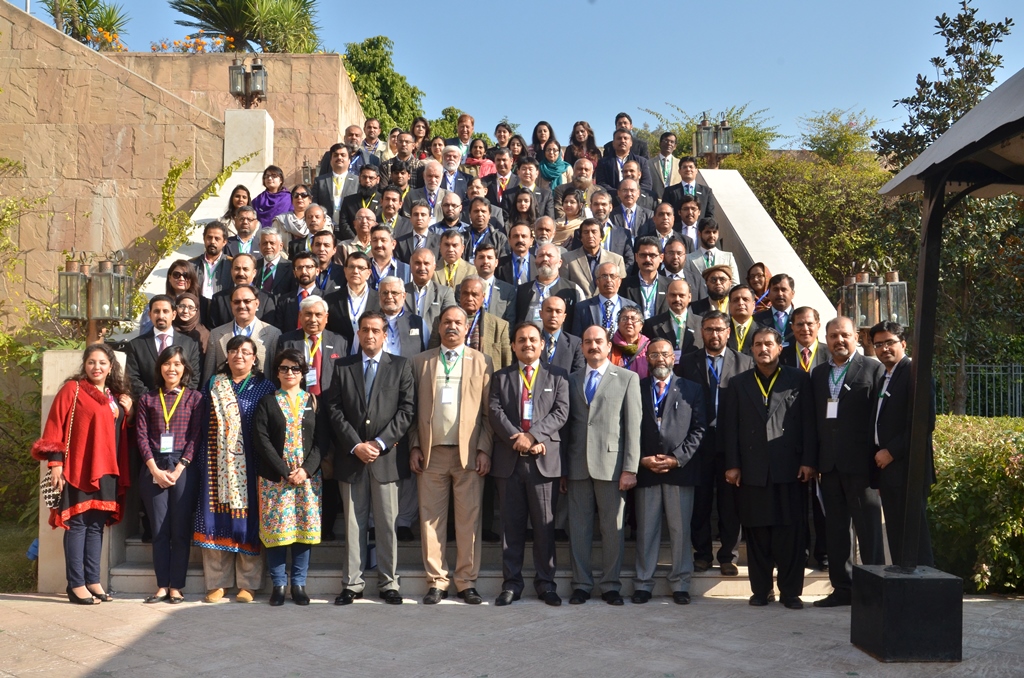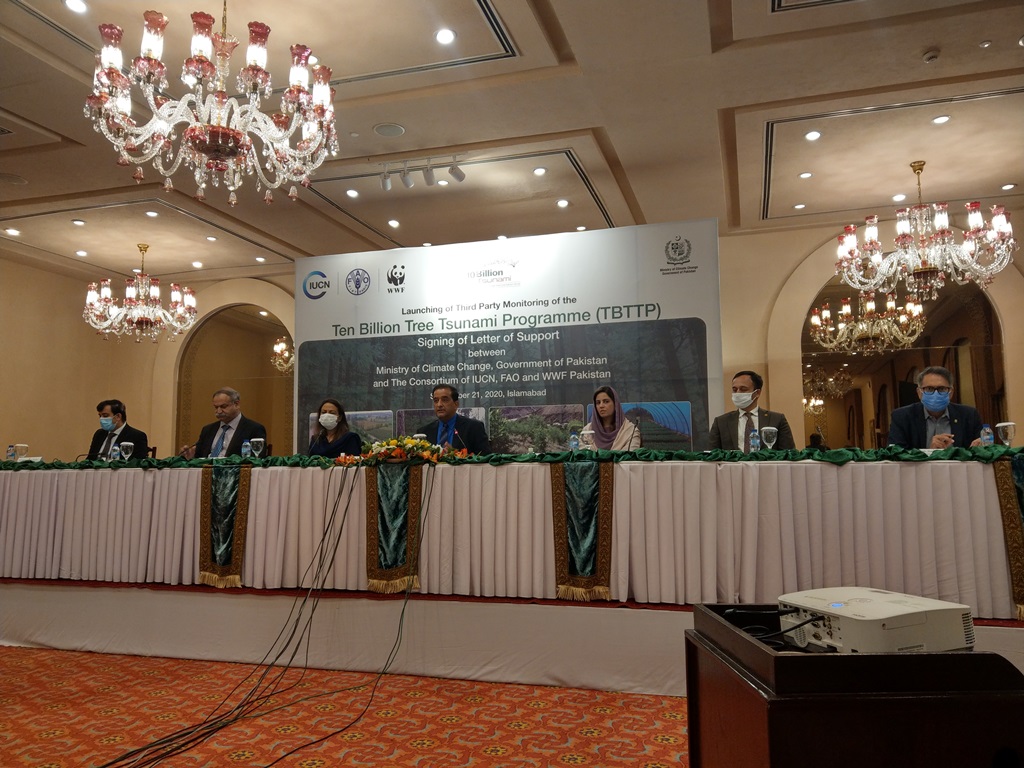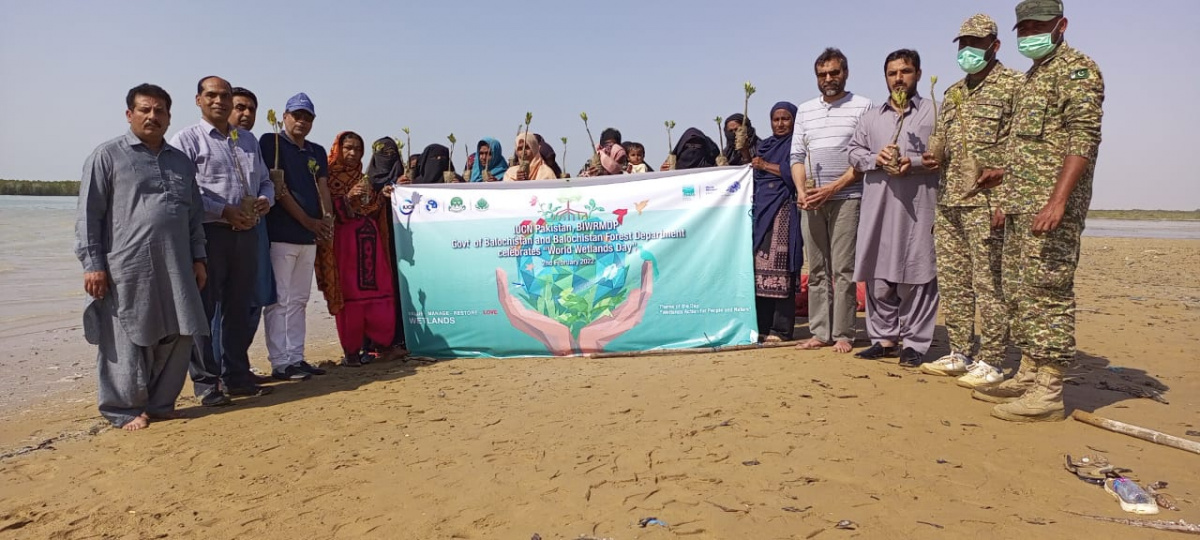Experts term transport sector major contributor to climate change National Conference on Sustainable Transport Debate Emissions and Transportation Issues in Pakistan
The national conference “Paving the Way for Sustainable Transport in Pakistan” commenced today in Islamabad, bringing together a wide range of national and international experts to discuss and share best practice and experiences in sustainable transport, as well as to draw attention to increasing emissions.

Photo: IUCN Pakistan
This conference was organized by IUCN, the International Union for Conservation of Nature, under the UNDP-GEF funded Pakistan Sustainable Transport (PAKSTRAN) Project, being implemented by the Ministry of Water and Power, Government of Pakistan under the leadership of Mr. Hassan Nasir Jamy, Additional Secretary, Ministry of Water and Power Government of Pakistan and National Project Director of PAKSTRAN.
Representatives from the government, media, academia, national and internationals NGOs, participated in the event.
The conference aims at sharing knowledge and generating valuable discussions on various aspects of sustainable transport including climate change and emissions, options for eco-friendly freight transport; and institutional mechanisms required to regulate the required actions.
In his keynote address Mr. Malik Amin Aslam former Minister of State for Environment and global IUCN Vice President said, “the year 2015 is the year of two landmark agreements: one of them is the transition from the Millennium Development Goals to the SDGs, which define a clear pathway for the entire world as to where it wants to go by 2030. The other is the COP21 framework agreement where 190 countries have agreed to come up with home grown solutions to limit global warming, after years of negotiations, and are now in agreement that the current pathway is not sustainable and needs to change. Mr. Aslam stressed the need to focus on the link between the Sustainable Development Goals (SDGs) and the transport sector which contributed more to climate change and environment both at regional and global levels than any other sector. “Pakistan loses one percent of its GDP owing to pollution and the major portion of it comes from the transport sector,” he disclosed. He assured the participants that the recommendations of the conference would be incorporated into Pakistan’s Climate Change policy.
Mr. Amanullah Khan, Assistant Country Director UNDP said that PAKSTRAN is a commendable initiative of the United Nations Development Programme (UNDP), Global Environmental Facility (GEF) which provides technical support to the Government of Pakistan. “It has helped in bringing the important topic of mass transit and sustainable transport to the forefront of today’s challenges. Today’s event provides an opportunity to learn from international experiences and discuss gaps, issues and suggest recommendations for future in the transport sector of Pakistan.
Dr. Muhammad Saleem Janjua, an eminent subject expert and National Project Manager of the PAKSTRAN Project explained that the PAKSTRAN Project was providing technical support to Government of Pakistan by focusing on the critical challenges being encountered by the transport sector. “Pakistan is an extremely low contributor to climate change, emitting even less than one per cent of global greenhouse emissions, but remains one of the worst victims of climate impacts,” he added.
He elaborated that through its four outputs and specialized expertise the PAKSTRAN team was assisting the Punjab and Sindh governments to create an enabling environment to promote sustainable transport initiatives. Furthermore, “the PAKSTRAN Project can further contribute through activities like today’s conference and targeted research that will expand the existing knowledge base, and look into the transport fuel efficiency issues by assisting in preparing GHG emissions baselines.” He explained that the strategically designed technical sessions of the conference would serve as a forum for knowledge dissemination and extracting practical recommendations by involving real stakeholders.
Mr. Mahmood Akhtar Cheema, Country Representative, IUCN Pakistan, said that road transport was the backbone of Pakistan's transport system. “To address the transport and related problems in the country, IUCN has partnered with the government to carry forward the agenda of sustainable transportation in Pakistan - PAKSTRAN represents that collaboration,” added Mr. Cheema. “Over the past ten years, road traffic, both passenger and freight, has grown faster than the national economy and traffic congestion is giving rise to environmental problems including increase in emissions and unsustainable energy consumption pattern,” noted Mr. Cheema. “This year’s national transport conference aims to provide a platform where researchers, professionals, academicians and key stakeholders share and generate debate on the latest integrated and sustainable transportation and appropriate solution,” Mr. Cheema explained.
Ms. Faela Sufa, Vice President of ITDP Indonesia, said that it was not an easy task to solve the transportation problem for many cities in the world, especially with “the world’s urban population projected between now and 2050 to increase from 3.4 to 6.4 billion.” While sharing international examples, Ms. Sufa explained that cities that have applied the Bus Rapid Transit (BRT), such as Bogota, Mexico and Guangzhou, were immensely benefiting from it. She quoted the example of Bogota where they have turned the city center into a transit mall which only allows buses, bicycles and pedestrian to access the city center. “Guangzhou BRT reduces travel time not only for bus passengers but also for cars. Improving pedestrians’ access, bicycle lane and bicycle sharing system are introduced along with the BRT corridor at these three cities,” disclosed Ms. Sufa.
Professor Chae Ilkwon of South Korea, emphasized the importance of upgrading the public transport system in Pakistan in a well planned manner. He strongly suggested the smart card system to make the payment for travel, so the travel time and cost can be tracked. Such system can be integrated with all kind of public transport. He also suggested various regulatory mechanisms for effective management of the system.



